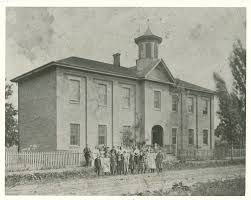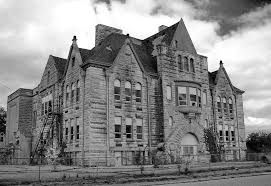
Education
The Industrial Revolution caused a lot of important changes in Britain. One of these changes was education.
Education before the Industrial Revolution was not accessible for children, but after the Industrial Revolution it was now accessible to the children of all socioeconomic backgrounds. Laws were set making education a requirement.
Before the 19th century most children in London did not go to school and educations were not free like most public schools are now, the poor children got educated in Dame schools or in Sunday schools. Only the sons of the most wealthy men would go to school. The daughters would be homeschooled. The literacy rates were extremely low, most children did not know how to read or write at all.
They only had two universities in England, four in Scotland and one in Ireland. Unfortunately only the men were allowed to attend to these universities.
There are people who say that some improvements were made because the public was starting to complain about the lack of education and support for young children.
-
Dame Schools are schools that are run by elderly woman, especially in their own homes.
-
Sunday Schools are school that educate children about Christianity and Judaism.
1833:
The British Government decided to give a helping hand to the education by promoting education in schools. They granted money to charities for the purpose of making education accessible to children of all socioeconomic divisions. The Government had made a law which required the children working in factories, to have two hours of education every day.
1844:
The Ragged School Union focused on education the poorer children of Britain.
It was the initiative of Lord Shaftesbury to set up schooling for the poor children. He understood the importance of education. He was not only the president of Ragged Schools Union, which helped him take the decision, as soon as there was progress in education he decided to improve the working class of other citizens of Britain.
-
A Ragged School is a name given by the Ragged School Union to many established schools after 1840 in the United Kingdom, which provided free education and sometimes if you were lucky they would give you free food, clothing, lodging and other home services for those too poor to pay.
1870:
In 1870, Froster's Act decided to put up state-funded board schools for Primary education and the Public Schools Act brought reform to the public school system in Britain by establishing requirement for educational standards.
1880:
In 1880, the Education Act made schools registration/attendance necessary for children to the age of 10 and below. Children above 11 years old would be taught in a different way.
1900:
In the 1900’s, the teachers did not have many rights. Teachers were kept apart by their gender; for example, female teachers were not allowed to marry during the term of her contract, or have men as company. Their were limitations for what the teachers could do. The female teachers were forbidden to smoke, dress in bright colours, dying their hair and they were not allowed to even travel beyond the city limitation without permission of the school board. If any teacher broke these, he or she would be fired instantly.
These rules changed over time.
1902:
The Education Act had established a system of secondary schools, although there were not many secondary schools to attend.
After the Industrial Revolution, education improved quite a lot considering educated people tend to make wiser decisions, which helps them become more wealthier and healthier. Education became a compulsory thing all over the world, it was the answer to save the problem of children working in factories, because education allowed them to think on their own, wether it is right or wrong of them to work, under age.
Education qualified tem to a certain level of knowledge, which they can later apply during a job of the profession they pick.
The reason the world has developed to be a better place to live is, education.
-
The income increased : because we have recieve good eduction nowadays, one extra year of schooling is able to increased an individual’s earnings.
-
Made people healthier : People are now able to good quality of food
- Saved many children’s lives ; They were able to make better decisions, which affected their lifespan.
- Raised crop yields ; Wages, agricultural income and productivity were higher then before they received education.
- Promoted Gender Equality ; People began to think about the rights of their opposite genders.

